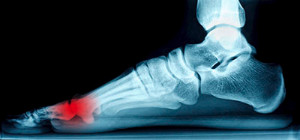 Many younger people who are physically active and engage in sports on regular basis often see inflammation in the sesamoid bones found under the toes This is referred to as sesamoiditis. This condition is considered to be a type of tendonitis, as the surrounding tendons become inflamed as well. Certain athletes and dancers may be afflicted by this often because additional weight is placed on the front of the foot. Common causes for this condition may include the sesamoid bones being involved in an injury, walking in shoes with thin soles, or wearing high heels. Inherited high arches that cause the foot to become stiff may be an additional cause. Possible treatments will likely include resting the foot, thus keeping it free from any weight bearing activities. Typically, wearing shoes with insoles that have adequate cushioning and support and choosing flat shoes instead of high heels are important choices to make if this condition is experienced. If you have pain in your foot you should make an appointment to see a podiatrist.
Many younger people who are physically active and engage in sports on regular basis often see inflammation in the sesamoid bones found under the toes This is referred to as sesamoiditis. This condition is considered to be a type of tendonitis, as the surrounding tendons become inflamed as well. Certain athletes and dancers may be afflicted by this often because additional weight is placed on the front of the foot. Common causes for this condition may include the sesamoid bones being involved in an injury, walking in shoes with thin soles, or wearing high heels. Inherited high arches that cause the foot to become stiff may be an additional cause. Possible treatments will likely include resting the foot, thus keeping it free from any weight bearing activities. Typically, wearing shoes with insoles that have adequate cushioning and support and choosing flat shoes instead of high heels are important choices to make if this condition is experienced. If you have pain in your foot you should make an appointment to see a podiatrist.
Sesamoiditis is an unpleasant foot condition characterized by pain in the balls of the feet. If you think you’re struggling with sesamoiditis, contact one of our podiatrists of The Podiatry Center, PC. Our doctors will treat your condition thoroughly and effectively.
Sesamoiditis
Sesamoiditis is a condition of the foot that affects the ball of the foot. It is more common in younger people than it is in older people. It can also occur with people who have begun a new exercise program, since their bodies are adjusting to the new physical regimen. Pain may also be caused by the inflammation of tendons surrounding the bones. It is important to seek treatment in its early stages because if you ignore the pain, this condition can lead to more serious problems such as severe irritation and bone fractures.
Causes of Sesamoiditis
- Sudden increase in activity
- Increase in physically strenuous movement without a proper warm up or build up
- Foot structure: those who have smaller, bonier feet or those with a high arch may be more susceptible
Treatment for sesamoiditis is non-invasive and simple. Doctors may recommend a strict rest period where the patient forgoes most physical activity. This will help give the patient time to heal their feet through limited activity. For serious cases, it is best to speak with your doctor to determine a treatment option that will help your specific needs.
If you have any questions please feel free to contact our office located in Millburn, NJ . We offer the newest diagnostic and treatment technologies for all your foot and ankle needs.
